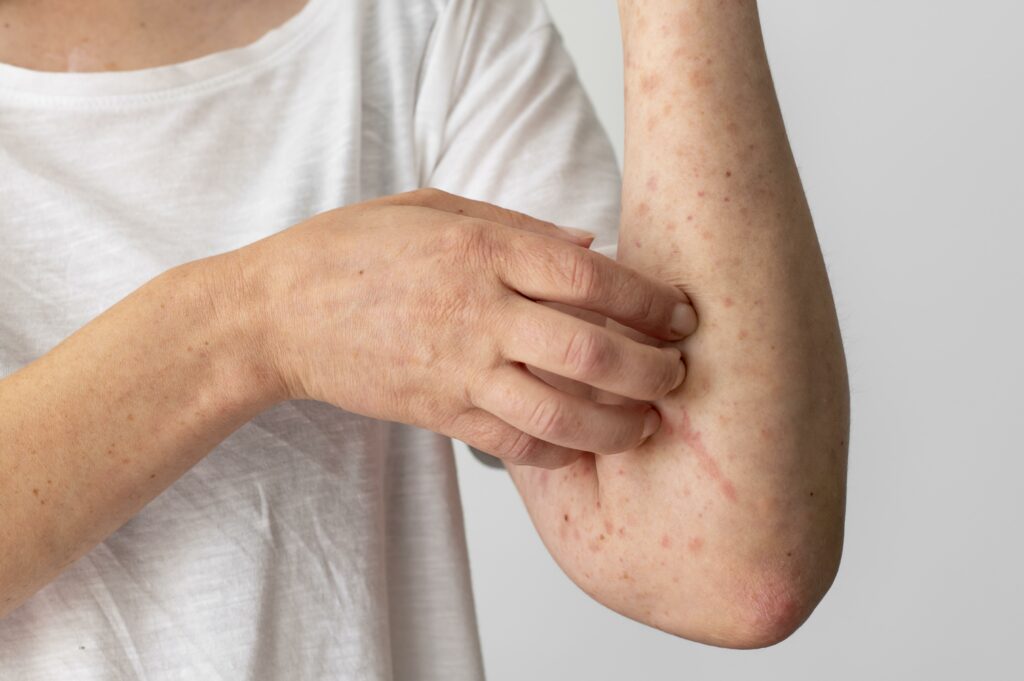Chronic Itch (Pruritis)
Will medical marijuana help to ease symptoms of Chronic Itch or Pruritis? Read below to find out.
What is Chronic Itch?
Pruritus is a medical term that simply means “itching.” It refers to a sensation of wanting to scratch your skin. Pruritus can be painful and irritating. It may affect one area of your body or spread throughout several locations.
Chronic itching is typically a symptom of an underlying medical condition. It can have various possible causes, the most common being contacting an allergen, dry skin, pregnancy, or a reaction to a medication.
Who does Pruritis affect?
Pruritus is standard and will affect most people for one reason or another at some point. The severity and frequency vary per individual. You may be more at risk of chronic pruritus if you:
- Are over 65 years old
- Have chronic allergies
- Have eczema, psoriasis, or diabetes.
- Are pregnant
- Are on dialysis
Types of Chronic Itch
The cause of itchiness and the location of the itch on your body categorizes several types of pruritus. Some common types of pruritus include:
- Brachioradial pruritus
- Nocturnal pruritus
- Pruritus ani
- Senile pruritus
- Uremic pruritus
Can You Be Allergic to Marijuana?
Medical Marijuana for Skin Relief
Cannabis, especially CBD, is highly prevalent in today’s society. CBD used to control pain and treat skin conditions can be traced back to ancient times, as they used it in abundance during religious practices and rituals. The earliest uses of cannabis for skincare can be traced back to Ancient Egypt. Pharaoh Ramses II was known to partake in cannabis and encouraged others to use the plant. Back then, hemp assisted in creating buildings and textiles.
During the 20th century, cannabis was extensively criminalized due to a societal outcry; however, changing laws and further research into the compounds within the plant led to a slow but vast reconsideration of their potential health benefits. The use of cannabis is becoming more widely accepted today due to the balancing effects of this particular cannabis-derived compound.
Skin Conditions
Certain skin conditions can cause chronic pruritis, including but not limited to the following:
Psoriasis
The National Psoriasis Foundation (NPF) describes psoriasis as an immune-mediated skin disease characterized by the inflammation of immature skin cells from a dysfunctional immune system. It is unclear what the exact cause of psoriasis is, and symptoms can occur at any age among men, women, children, and people of all ethnicities.
Recent peer-reviewed studies within the dermatological science field show that CBD, as a complementary treatment with other medications and sometimes even as an oil or topical therapy for affected skin, offers potential benefits for people with psoriasis. Specific CBD dose-related effects may even offer an immune response in slowing cell growth so that new skin cells react differently.
Eczema
Atopic dermatitis is the most common form of eczema. It causes inflammation, dryness, and itchy skin. Atopic dermatitis is typically found on the skin of young children; however, it can occur at any age.
CBD, THC and other cannabinoids could benefit this condition through ointment and oils, creams, salves, or moisturizers to relieve pain and inflammation, provide skin hydration, and stop the irritation of those red patches of skin cells. Some researchers believe that topical cannabis products can potentially treat the most common form of eczema called atopic dermatitis (AD). Medicinal marijuana is also known for its anti-inflammatory properties for the skin.
Rosacea
Rosacea is a common disorder that typically affects facial skin. It can cause redness on the chin, cheeks, nose, or forehead. Over time, the redness may take on a flush appearance as small blood vessels become visible.
Recent peer-reviewed studies within the dermatological science field show that CBD, as a complementary treatment with other medications and sometimes even as an oil or topical therapy for affected skin, offers potential benefits. Specific CBD dose-related effects may even provide an immune response in slowing cell growth so that new skin cells react differently.
Shingles
Because of the ECS in the skin can help significantly treat itching, eczema, acne, psoriasis, skin cancer, and more. Many patients with shingles also deal with extreme itching, which cannabis can help. Cannabinoids bind to fat cells, and there are a lot of cannabinoid and TRP receptors in the skin that both play a role in the onset of itching. Researchers believe that TRP receptors may serve as ionotropic cannabinoid receptors meaning they may assist in reducing pain and inflammation in the skin nerves.
Recent studies from medicine and health sciences professionals suggest that certain cannabis products may effectively treat the overactive immune system. It can connect with the cannabinoid receptors of the body to combat the proinflammatory t-cell responses needed.
It has been used to treat rare skin conditions, Crohn’s disease, neuropathic pain, particularly autoimmune disease, inflammatory bowel disease, acute psychosocial stress, and many other conditions. More research is needed to make an accurate scientific determination of the health benefits of medical marijuana.
Internal Medical Issues
A chronic itch can be caused by many internal medical conditions, including but not limited to the following:
Diabetes
The Texas A&M School of Public Health performed a 2022 data analysis study that examined national survey results from over 15,000 people. They found that female cannabis consumers who consumed substantial amounts of cannabis had a lower incidence of diabetes than females with little to no cannabis use.
A 2016 trial in Diabetes Care found that THCv could present a new therapeutic option for glycemic control in people with type 2 diabetes.
The authors noted that using THCV significantly impacts fasting blood glucose levels and improves pancreatic function.
A 2013 study of around five-thousand adults found that marijuana use was associated with lower fasting insulin levels, insulin resistance, and smaller waist circumference. Cannabis use acts through the direct and indirect stimulation of cannabinoid receptors in the endocannabinoid system. This cell-signaling system modulates the body’s central nervous system and helps maintain homeostasis.
Researchers have also found that CBD lowers resistin levels and increases gastric inhibitory polypeptide that triggers insulin production. Since CBD possesses anti-inflammatory properties may be a vital protective tool for diabetes patients.
Lupus
The cannabinoids found in the cannabis plant can activate the endocannabinoid system in the human body and may help many chronic issues, such as itching. Cannabis activates CB1 receptors in the central nervous system and CB2 receptors in organs, muscles, and tissues. Cannabinoids can directly influence our ability to maintain homeostasis.
CB1 receptors are responsible for large and small bowel muscles and digestion in the intestines. Activating the CB2 receptors targets immune cells that can reduce intestinal pain and inflammation. Cannabinoids can even interact with other receptors influencing everyday autoimmune functions.
Skin Cancer
Medical marijuana is commonly found to possess significant anti-inflammatory and antioxidant properties, which can quickly help with chronic pain management and chemotherapy-induced itching. Cannabinoid receptors within a cannabis Sativa plant bind to the brain and peripheral nerve cells and help regulate how you see and feel the pain to reduce symptoms like nausea, chronic pruritis, vomiting, and severe cancer pain.
Medical marijuana use, as opposed to other non-cannabinoid drugs, appears to be an excellent alternative to treat brain cancer patients and manage pain due to nerve damage or chemotherapy and other cancer treatments. Its medical use can also promote appetite in cancer patients who have experienced appetite and weight loss.
Last Updated: June 14, 2024
Get Your Medical Card
Connect with a licensed physician online in minutes
Table of Contents
Keep Reading
-
The Role Of Cannabis In Pain Management: A Holistic Approach
Find out how cannabis can revolutionize pain management and improve your quality of life. Click now to explore the holistic benefits of this natural remedy and take control of your pain today!
-
Cannabis Vs Prescription Drugs: A Comprehensive Comparison
Unlock the truth about cannabis vs prescription drugs! Dive into this in-depth analysis and discover which one dominates. Don’t miss out on eye-opening revelations – click now for an enlightening read!
-
Exploring The Long-Term Effects Of Medical Marijuana Use
Uncover the eye-opening long-term effects of medical marijuana use and revolutionize your perception. Click now to gain invaluable insights that could reshape your understanding of this potent plant.




